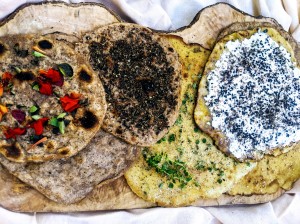Tag : bread
July 27, 2020 by admin
Making Flatbread to Nourish Your Body and Spirit
Since humans first tamed fire and turned grain into flour, we have been making bread. In the earliest form, breads were simple. Mix one or more flours with water. Pat out into a flat cake. Cook on a hot rock or a stone hearth around an open fire. That’s it. So simple, so basic to survival. And something shared by all peoples on Earth throughout history.
As we’ve seen during this pandemic, baking bread is about more than just survival. There’s something about the bread-making process that is compelling. It’s elemental, grounding, nourishing in the most essential ways. We are now also in a time of social and political upheaval and change, which makes the qualities of bread’s emotional sustenance even more important, especially when understood together with the centrality of bread in nearly every culture, historically and in our world today. Bread, in various forms, is something all peoples share.
This awareness led me to conceive a Lilith online class focused on basic flatbreads. Participants gathered over Zoom one recent Friday afternoon before Shabbat. As I talked and mixed, kneaded and rolled out each flatbread, I felt myself becoming calmer, more centered in the moment and even more content. I ate my Shabbat dinner that night outside on my rowhouse deck in a D.C. city neighborhood—just a salad and two flatbreads from the class, one with cumin, mint and garlic in the dough topped with labne and black sesame seeds, and the other brushed with olive oil, a generous sprinkling of my homemade za’atar and pieces of beautiful, edible red nasturtium from my deck garden.
We know that bread—lechem, in Hebrew—is central to Jewish life, as demonstrated by the blessings we say before and after eating it, as well as rituals around bread such as Shabbat and holiday challot. During the tashlich ritual at Rosh Hashanah, we use bread crumbs thrown on flowing water to carry away our sins of the old year so we enter the new year ready to do better.
Bread is mentioned hundreds of times in the Torah, the first when Adam ate from the forbidden tree. God then tells Adam that now in order to have bread–food–he will have to earn it “by the sweat of your brow.” It is the moment when humans, leaving the Garden of Eden, become responsible for feeding themselves.
Torah aside, what I realized that Shabbat evening under the slowly darkening sky was how complete I felt eating the flatbread that I had made with just flour and water, as women have made it for millennia. With that simple meal, I felt deeply, indescribably connected to Shabbat and to the long history of food entwined with my ancestral Judaism.
SUSAN BAROCAS, The Lilith Blog
- No Comments
June 18, 2020 by admin
Making Flatbread to Nourish the Body and Spirit
Since humans first tamed fire and turned grain into flour, we have been making bread. In the earliest form, breads were simple. Mix one or more flours with water. Pat out into a flat cake. Cook on a hot rock or a stone hearth around an open fire. That’s it. So simple, so basic to survival. And something shared by all peoples on Earth throughout history
 As we’ve seen during this pandemic, baking bread is about more than just survival. There’s something about the bread-making process that is compelling. It’s elemental, grounding, nourishing in the most essential ways. If you haven’t (yet) baked bread during this time, your Facebook feed and Instagram have almost certainly been full of pictures of all kinds of breads people you know have made when forced to stay at home. Sourdough, which takes daily attention to keep the starter alive, has been particularly popular. It’s hard not to draw some symbolism from that.
As we’ve seen during this pandemic, baking bread is about more than just survival. There’s something about the bread-making process that is compelling. It’s elemental, grounding, nourishing in the most essential ways. If you haven’t (yet) baked bread during this time, your Facebook feed and Instagram have almost certainly been full of pictures of all kinds of breads people you know have made when forced to stay at home. Sourdough, which takes daily attention to keep the starter alive, has been particularly popular. It’s hard not to draw some symbolism from that.
- 1 Comment
April 3, 2020 by Michelle Brafman
Desperately Seeking Yeast
On day nine of Governor Hogan’s quarantine, I embarked upon a journey to find yeast. My daughter, uprooted from her college life, had decided that she wanted to make challah for Shabbat before Passover began. What a way to connect with her faith! What a perfect project for a quarantine! What a life skill!
My weekly trip to Whole Foods coincided with this particular Friday morning, so I armed myself with a packet of my precious stash of anti-bacterial wipes and hit the crowded store. With some clever maneuvering of my cart, I made my way to the baking aisle. No yeast to be found.
- 2 Comments
 Please wait...
Please wait...